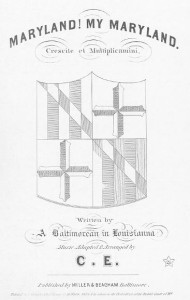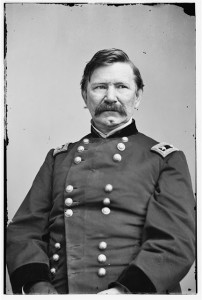Like a song I can’t get out of my head, I just can’t seem to let go this statement about March 7, 1863:
Federal troops in Baltimore, Maryland, confiscate all song sheets that are deemed “secession music.”[1]
I have not seen much amplification anywhere, although the fact is propagated throughout the Civil War internet. Here’s an example that gives the credit to Robert Cumming Schenck, who was in command of the Union army’s VIII Corps at the time:
Gen. Robert Schenk issues orders that prohibit the sale of secession-oriented sheet music in his department, headquartered in Baltimore.
According to the Wikipedia link the Ohioan political general was an early supporter of Abraham Lincoln for president:
… in September 1859, Schenck delivered a speech in Dayton regarding the growing animosity within the country. In this speech, Schenck recommended that the Republican Party nominate Abraham Lincoln for the presidency.
This was, perhaps, the first public endorsement of Lincoln for the presidency. He supported Lincoln with great ardor at the Chicago Convention in 1860 and in the campaign that followed.
After being permanently injured in the right arm at Second Bull Run:
He was unfit for field duty for six months, but was assigned to the command of VIII Corps, embracing the turbulent citizens of Maryland, repressing all turbulence and acts of disloyalty or any complicity with treason. General Schenck was not popular with the disloyal portion of the inhabitants of Maryland. In December 1863, he resigned his commission to take his seat in Congress.
I guess it is not surprising that General Schenck would find songs like Maryland, My Maryland offensive. The song is said to be referring to an unnamed Lincoln as a tyrant and despot.
- [1]Fredriksen, John C. Civil War Almanac. New York: Checkmark Books, 2008. Print. page 268.↩


